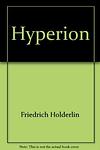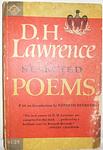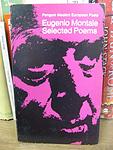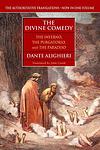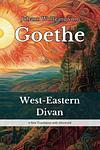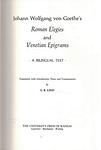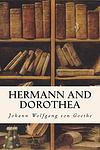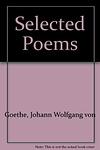The Greatest Italian, German "Poetry" Books of All Time
Click to learn how this list is calculated.
This list represents a comprehensive and trusted collection of the greatest books. Developed through a specialized algorithm, it brings together 300 'best of' book lists to form a definitive guide to the world's most acclaimed books. For those interested in how these books are chosen, additional details can be found on the rankings page.
Genres
Poetry is a genre of literature that uses language to evoke emotion, paint vivid imagery, and convey complex ideas through the use of rhythm, meter, and sound. It is characterized by its use of figurative language, such as metaphors and similes, and its ability to capture the essence of a moment or experience in a concise and powerful way. Poetry can take many forms, including sonnets, haikus, free verse, and spoken word, and can cover a wide range of topics, from love and nature to politics and social issues. As a category for books, poetry offers readers a unique and intimate glimpse into the human experience, inviting them to explore the beauty and complexity of language and the world around them.
Countries
Date Range
Reading Statistics
Click the button below to see how many of these books you've read!
Download
If you're interested in downloading this list as a CSV file for use in a spreadsheet application, you can easily do so by clicking the button below. Please note that to ensure a manageable file size and faster download, the CSV will include details for only the first 500 books.
Download-
1. The Divine Comedy by Dante Alighieri
In this epic poem, the protagonist embarks on an extraordinary journey through Hell (Inferno), Purgatory (Purgatorio), and Paradise (Paradiso). Guided by the ancient Roman poet Virgil and his beloved Beatrice, he encounters various historical and mythological figures in each realm, witnessing the eternal consequences of earthly sins and virtues. The journey serves as an allegory for the soul's progression towards God, offering profound insights into the nature of good and evil, free will, and divine justice.
-
2. Faust by Johann Wolfgang von Goethe
The book is a tragic play in two parts that tells the story of a scholarly man named Faust, who becomes dissatisfied with his life and makes a pact with the devil, Mephistopheles. In exchange for unlimited knowledge and worldly pleasures, Faust agrees to give his soul to Mephistopheles after death. The narrative explores themes of ambition, despair, love, and redemption, ultimately leading to Faust's salvation.
-
3. Complete Poems of Giacomo Leopardi by Giacomo Leopardi
This book is a comprehensive collection of the poetic works of a renowned Italian poet. The poems cover a wide range of themes, from love and nature to philosophy and social issues, showcasing the poet's profound understanding of human nature and the world. The collection also includes his celebrated "Canti" and other lesser-known works, all presented in their original Italian language, making it a valuable resource for those interested in Italian literature and culture.
-
4. Hyperion by Friedrich Holderlin
The novel explores the life and thoughts of a young German named Hyperion who spends much of his time in Greece. He is torn between his love for his homeland and his disgust with contemporary German society. Through a series of letters to his German friend Bellarmin, Hyperion narrates his participation in the Greek struggle for independence from the Ottoman Empire, his disillusionment with war, and his intense love for the Greek woman Diotima. The novel is a meditation on beauty and suffering, wisdom and madness, and the dichotomy between the ideal and the real.
-
5. Poems by Paul Celan
This book is a collection of deeply moving and thought-provoking poems that delve into themes of love, loss, history, identity, and the human condition. The poems are marked by their haunting imagery, complex symbolism, and profound exploration of the Holocaust and its aftermath. The author's unique style and powerful language make this collection a compelling read, offering readers a glimpse into the emotional depth and intellectual complexity of his experiences and reflections.
-
6. The Duino Elegies by Rainer Maria Rilke
"The Duino Elegies" is a collection of ten elegies that delve into the complexities of human existence, exploring themes of love, death, time, God, and the nature of reality. The author uses vivid and often unsettling imagery to convey a sense of the profound beauty and pain inherent in the human experience. The elegies are named after the castle of Duino, where the author began writing them, and they are renowned for their introspective depth and philosophical insight.
-
7. The Selected Works of Cesare Pavese by Cesare Pavese
This collection showcases the best works of a renowned Italian author and poet who was deeply influenced by American literature and culture. The book includes his writings that explore themes of loneliness, self-loathing, and existential despair, often set against the backdrop of rural Italy. The author's unique style of storytelling, characterized by his use of simple language and profound introspection, is highlighted in this compilation.
-
8. Poems of Eugenio Montale by Eugenio Montale
The book is a collection of poems by an acclaimed Italian poet. It explores themes of love, nature, time, and mortality, characterized by a unique blend of vivid imagery and philosophical insight. Through his words, the poet offers a deeply personal and introspective look at the human condition, all the while maintaining an intense connection with the natural world. His profound and evocative language has made him one of the most respected figures in 20th-century Italian literature.
-
9. Germany, a Winter Tale by Heinrich Heine
"Germany, a Winter Tale" is a satirical epic poem that criticizes the political and social state of Germany in the 19th century. The narrative follows the author's journey through his homeland, where he encounters various figures and situations that embody the cultural and political issues of the time. The author uses humor and irony to expose the hypocrisy, corruption, and stagnation in German society, while also expressing his longing for a more progressive and enlightened future.
-
10. Petrarch's Songbook by Francesco Petrarca
"Petrarch's Songbook" is a collection of 366 poems by the Italian scholar, poet, and humanist. The book is divided into two parts, the first part comprising of love sonnets dedicated to his muse Laura, whom he met in Avignon in 1327, and the second part contains poems written after Laura's death. The poems are notable for their personal and emotional intensity, reflecting the poet's innermost thoughts and feelings. They also represent a significant contribution to the development of the Italian sonnet form and have had a profound influence on European poetry.
-
11. Poems of Friedrich Hölderlin by Friedrich Holderlin
This book is a collection of poems by a renowned German poet of the late 18th and early 19th century. The poems reflect the author's deep connection with nature, his philosophical musings on the divine and the human condition, and his struggles with mental illness. His work is seen as a bridge between the rationalism of the Enlightenment and the passion of Romanticism, and his unique style and themes have had a profound influence on later generations of poets and thinkers.
-
12. Jerusalem Delivered by Torquato Tasso
The epic poem unfolds during the First Crusade, depicting Christian knights led by Godfrey of Bouillon as they lay siege to Jerusalem, aiming to recapture the holy city from Muslim control. The narrative weaves together themes of love, valor, and chivalry, with a cast of characters that includes the brave knight Rinaldo and the enchanting sorceress Armida. As the warriors confront various supernatural and earthly challenges, the poem explores the conflict between Christian duty and personal passion, ultimately celebrating the virtues of heroism and piety in the quest for divine providence and the triumph of Christian faith.
-
13. The Inferno by Dante Alighieri
The book is an epic poem that takes the reader on a profound journey through the nine circles of Hell, guided by the ancient Roman poet Virgil. The narrative follows the author's alter ego as he embarks on a quest for salvation, encountering the souls of the damned and witnessing the divine justice meted out for their earthly sins. The vivid and often harrowing depictions of the torments suffered by the inhabitants of the underworld serve as an allegory for the spiritual trials that individuals must overcome. This journey is not only a personal one but also represents the soul's path towards God, exploring themes of morality, redemption, and the nature of sin.
-
14. Selected Poetry by Rainer Maria Rilke
This collection brings together a rich tapestry of verse from one of the most significant poets of the 20th century, offering readers a glimpse into the profound depth and breadth of his work. The poems traverse themes of love, nature, spiritual longing, and the quest for artistic expression, all conveyed with a lyrical intensity and a profound sensitivity to the beauty and complexity of the human experience. The poet's masterful use of language and evocative imagery invites readers to explore the nuances of emotion and thought, capturing the transcendent and the ephemeral in a way that resonates across time and cultures.
-
15. Lyric Poems by Petrarch
"Lyric Poems" is a collection of deeply emotional and introspective poetry that delves into the themes of love, desire, and beauty, often through the lens of the author's infatuation with an idealized woman. The poems are characterized by their elegant and refined language, reflecting the poet's classical learning and his role in the early Renaissance humanist movement. The work is significant for its use of the sonnet form, which the poet perfected and popularized, influencing generations of writers. The poems oscillate between joy and despair, capturing the complexities of the human heart and the poet's own intellectual and emotional journey.
-
16. West Eastern Divan by Johann Wolfgang von Goethe
The book in question is a collection of lyrical poems that reflects the author's fascination with Persian culture, inspired by the works of the Persian poet Hafez. It serves as a poetic dialogue that bridges Western and Eastern cultural traditions, exploring themes of love, wine, and the nuanced interplay between nature, humanity, and the divine. The work is notable for its attempt to transcend cultural barriers and promote understanding between the Occident and the Orient, showcasing the author's deep appreciation for the richness of Middle Eastern literature and philosophy.
-
17. Venetian Epigrams by Johann Wolfgang von Goethe
"Venetian Epigrams" is a collection of short, incisive poems that reflect the author's observations and experiences during a stay in Venice. Written with a blend of wit, irony, and lyrical beauty, the epigrams delve into themes such as love, sexuality, art, and the nature of society. The author's sharp commentary on the Venetian way of life, as well as his personal reflections on human relationships and the pursuit of pleasure, are presented in a concise and often provocative manner, revealing the depth of his engagement with the culture and the vibrancy of the city that inspired him.
-
18. The New Life by Dante Alighieri
"The New Life" is a prose work that combines both poetry and an autobiographical narrative to explore the themes of love and spiritual longing. The text recounts the author's intense love for a woman named Beatrice, whom he first sees at a young age and becomes enamored with, despite their minimal interaction. Her sudden death plunges him into a state of grief and prompts a profound journey of philosophical and theological inquiry. The work is a meditation on the nature of love, its connection to the divine, and the transformative power it holds. Through a series of poems and reflective prose passages, the author examines the impact of this idealized and unattainable love on his life and work, ultimately finding a new understanding of the relationship between earthly passion and eternal life.
-
19. Hermann And Dorothea by Johann Wolfgang von Goethe
This classic narrative poem tells the story of two young people, Hermann and Dorothea, who find love amidst the turmoil of war. Set against the backdrop of the French Revolution's impact on Germany, the poem explores themes of duty, community, and the personal transformations that arise from political upheaval. Hermann, the son of a prosperous innkeeper, initially sets out to aid refugees fleeing the conflict and encounters Dorothea, a strong and principled woman among them. Their relationship develops as they navigate the challenges of their time, ultimately leading to a union that symbolizes hope and the enduring human spirit in the face of adversity.
-
20. Poems Of Johann Wolfgang Von Goethe by Johann Wolfgang von Goethe
This collection encapsulates the lyrical genius of one of Germany's most revered literary figures, offering a diverse selection of poetry that spans themes of love, nature, and the human condition. The poems reflect the author's profound insight into the complexities of the soul and the beauty of the world around him, showcasing his mastery of language and his ability to evoke deep emotion and contemplation. The work is a testament to the enduring power of poetic expression and the timeless relevance of the author's reflections on life and art.
-
21. Poems Of Tommaso Campanella by Tommaso Campanella
The book is a collection of philosophical and visionary poetry written by a 16th-century Italian philosopher and poet. The poems delve into themes of utopian society, metaphysics, and the critique of contemporary political and religious institutions. The author's work reflects his radical ideas and his quest for knowledge, as well as his experiences of imprisonment due to his heterodox beliefs. His poetry is characterized by a deep sense of spirituality and a longing for intellectual and social reform, offering a glimpse into the mind of one of the early modern period's most provocative thinkers.
-
22. Roman Elegies by Johann Wolfgang von Goethe
"Roman Elegies" is a collection of twenty-four poems that celebrate the classical heritage of ancient Rome while reflecting on contemporary European society. The poems are notable for their eroticism and the personal nature of their content, as they delve into the author's own experiences and emotions during his time in Italy. Through a blend of personal reflection and homage to the ancient world, the work explores themes of love, art, and the human experience, blending the sensual with the intellectual. The elegies are a testament to the author's passion for classical culture and his mastery of poetic form, as well as his ability to infuse his verse with both the depth of his scholarly interests and the intensity of his personal feelings.
-
23. Rime by Gaspara Stampa
"Rime" is a poignant collection of Italian sonnets and madrigals that delve into the depths of unrequited love, passion, and longing. The poems, penned by a renowned female poet of the Renaissance, reflect her intense emotional journey and her struggle with the societal constraints of her time. Through her lyrical mastery and vivid imagery, the poet explores themes of desire, sorrow, and the search for artistic and personal recognition, offering a raw and intimate glimpse into the soul of a woman ahead of her time, who channels her heartache into a lasting literary legacy.
-
24. Sonnets And Madrigals by Michelangelo Buonarroti
"Sonnets and Madrigals" is a collection of deeply personal and reflective poetry by one of the Renaissance's most iconic figures, known primarily for his monumental contributions to art and architecture. The poems reveal a lesser-known side of the artist's creative genius, exploring themes of love, beauty, spirituality, and human emotion. Through the structured elegance of sonnets and the lyrical flow of madrigals, the poet delves into the complexities of the human condition, offering insights into his own inner life and the intellectual currents of his time. The work stands as a testament to the multifaceted talent of an individual who could express profound ideas not only through visual mediums but also through the power of the written word.
-
25. Selections by Petrarch
"Selections" is a compilation of writings from a prominent Italian scholar and poet of the early Renaissance, known for his humanist contributions and lyrical poetry. The book encompasses a range of his works, including personal letters, philosophical treatises, and perhaps most famously, a series of sonnets dedicated to his idealized love, Laura. These writings reflect the author's deep engagement with classical antiquity, his introspective examination of human emotions, and his influence on the development of vernacular literature. His exploration of individual experience and expression of personal longing mark a significant departure from the medieval traditions of the time, positioning him as a forerunner of Renaissance humanism.
Reading Statistics
Click the button below to see how many of these books you've read!
Download
If you're interested in downloading this list as a CSV file for use in a spreadsheet application, you can easily do so by clicking the button below. Please note that to ensure a manageable file size and faster download, the CSV will include details for only the first 500 books.
Download


